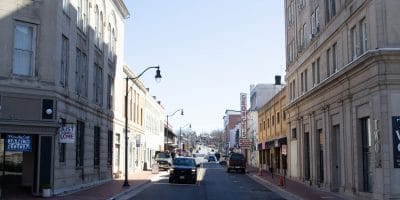A contributed perspectives piece by Peregrin Sanchez
Since 1970, communities across the world have come together in June to celebrate LGBTQ+ identities for Pride Month. And despite recent pushback and attempted censorship, Harrisonburg has overall lived up to the name Friendly City when it comes to the local LGBTQ+ community.
For local businesses in particular, allyship can be crucial to success: studies show that openly inclusive businesses have higher sales, a larger and more loyal customer base, better brand recognition, and attract–and retain–better talent. It can be hard to know where to start on being a good business ally, so here are some steps to create a more inclusive environment year-round for your employees, customers, and the community as a whole. These suggestions can also help avoid “rainbow capitalism” — waving a rainbow flag and selling pride merchandise in June before returning to business as usual in August, which is performative and does little to support the community.
1. Start with the little things:
Encourage the use of pronouns in email signatures, and give employees the option to add pronouns to nametags or wear pronoun pins, like the staff at Friendly City Co-op. Avoid gendered dress codes/uniforms when possible. If you can, remove gendering on single-stall restrooms and changing rooms, products, and signage (ex “dresses” vs “womenswear”). Don’t be afraid to stand for your values and call out or even cut ties with openly disrespectful or hateful customers, vendors, or employees if needed.
2. Educate yourself (and your staff):
Train your staff to use inclusive language (for instance: “hello all” versus “you guys/ladies”; or “they” versus “he or she”; or using terms like “server, attendant, spouse/partner” instead of “waiter, stewardess, husband/wife”). Listen to your LGBTQ+ employees and ask how you can better support them without expecting them to educate others. Instead, use online or local resources to learn the basics, hire an outside consultant or schedule workshops to address your specific needs. The staff DEI committee at Virginia Mennonite Retirement Community, for example, works with Eastern Mennonite University’s Social Work department to help develop inclusive policies and programming from a Christian lens, while Healthy Community Health Centers has had FCSS conduct guest presentations on LGBTQ+ needs in healthcare.
3. Share Your Space:
Consider working with and uplifting LGBTQ+ -owned businesses, organizations, and community members. Parenthesis Books carries books by local LGBTQ+ authors, Sage Bird Cider Works hosts a monthly Pride Night to benefit FCSS, and many businesses, including Court Square Theater, Mashita, and The Ridge Room have hosted performances by legacy drag organization Rhinestone Productions. Businesses can also open their space for local LGBTQ+ artists, or even host community-based events. Aristocat Cafe, for example, hosts a community-run Queer Fantasy Book Club.
4. Share your Skills or Resources:
Offering pro-bono or sliding-scale services can be another great form of partnership. Morgan Kraybill Gross of Valley Creative Reuse has led free crafting workshops and Nicole Bruce of The Center Yoga Studio partners frequently with both the Collins Center and FCSS to hold free trauma-informed and gender-inclusive yoga classes, while Erin West with Northwestern Mutual offers free financial planning to LGBTQ+ community members every last Thursday of the month. Donating gift certificates or gift bags as raffle prizes for fundraisers and auctions, direct sponsorship for LGBTQ+ community events, or giving back a percentage of proceeds to national, state or local organizations like the Trevor Project, Equality Virginia, or Friendly City Safe Space can also be a way to support community programming.
For more on allyship, or for inquiries about partnerships, trainings, or workshops, contact us at [email protected]
Peregrin Sanchez (he/him) is the current director of the Friendly City Safe Space, President and co-founder of the Rocktown Writers Guild, and an avid fountain pen enthusiast.











